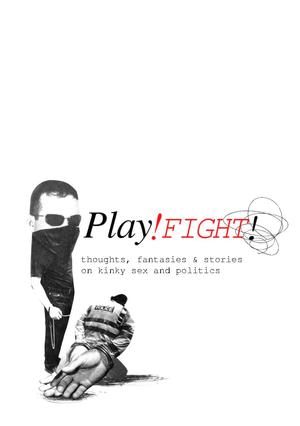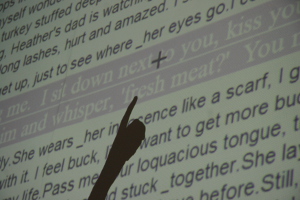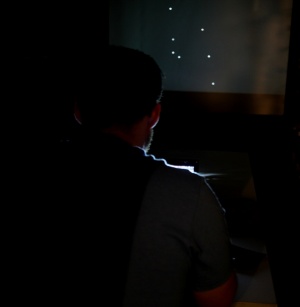User:Eleanorg/2.1/gradProposal1: Difference between revisions
| Line 41: | Line 41: | ||
==Technological context: post-digital publishing== | ==Technological context: post-digital publishing== | ||
This research responds to a context in which online publishing has radically changed what it means to publish a cultural object, and what the nature of that object is. No longer singular and stable, networked documents are vulnerable to others with which they are linked. (For example: dynamic websites break when an API is changed; images embedded from other servers can disappear; news feeds fill personal sites with unpredictable external content.) This has brought with it an exciting uncertainty about the status of the singular, proprietorial author who creates and controls a discrete document. | This research responds to a context in which online publishing has radically changed what it means to publish a cultural object, and what the nature of that object is. No longer singular and stable, networked documents are vulnerable to others with which they are linked. (For example: dynamic websites break when an API is changed; images embedded from other servers can disappear; news feeds fill personal sites with unpredictable external content.) This has brought with it an exciting uncertainty about the status of the singular, proprietorial author who creates and controls a discrete document (a topic I have previously written about [[User:Eleanorg/1.2/RWR/Essay_Draft_2 | here]] and [[http://http://eleanorg.org/openwide | here]]). This porosity of networked documents is decentralizing 'curation' in an unprecedented way (London IMC, 2012; Ludovico, 2012; Pariser, 2011), but with an increasingly individualist focus which misses the opportunity to ask how we might "collectivize the individual outputs" being produced (London IMC, 2012). | ||
In contrast to this individualistic 'user as curator' approach, I will be embracing the possibility of disrupting authorship by looking at how networked documents, and people, can act as transmitters or hosts for the ideas of others. (Ie, publishing doing the opposite of its usual task of amplifying an author's singular voice). I propose this as an exercise in setting aside the individual ego, in an attempt at a more communal sociality. This exercise is informed by my previous work arguing for a productive embrace of the crisis over authorship | In contrast to this individualistic 'user as curator' approach, I will be embracing the possibility of disrupting authorship by looking at how networked documents, and people, can act as transmitters or hosts for the ideas of others. (Ie, publishing doing the opposite of its usual task of amplifying an author's singular voice). I propose this as an exercise in setting aside the individual ego, in an attempt at a more communal sociality. This exercise is informed by my previous work arguing for a productive embrace of the crisis over authorship , and in opposition to those discourses attempting to resist it by shoring up traditional discourses of author as autonomous producer. | ||
== Practical steps == | == Practical steps == | ||
Revision as of 23:12, 19 November 2012
General Introduction
"If I am struggling for autonomy, do I not need to be struggling for something else as well, a conception of myself as invariably in community, impressed upon by others[?]"
(Butler 2004, p.21).
I will be exploring the possibilities of networked publishing to create porous documents, responsive and vulnerable to the input of others. I will develop a publishing model which aims to provoke reflection on the role played by those editing or assembling collections of other people's work.
Relation to previous practice
I am interested in what happens to individual agency or authorship when people encounter others, especially where the aim is to collaborate. For this reason I have situated past projects in the context of political organizing: a setting in which the tension between individual agency and collective solidarity is often pronounced. While considering myself a supportive 'insider' within UK leftist/feminist activism, my work takes a critical approach which invites project participants to reflect upon how these groups organize in practice. How do they replicate - or avoid replicating - the hierarchies they claim to oppose?
In 2010 I begun the online publishing platform 'Radical X', whose aim was to critically explore the sexual politics of anti-authoritarian activist groups [1]. The intention was to treat sexual politics as part of a broader activist concern with re-thinking interpersonal relations, including this primary tension between the autonomous individual and the solidarity-based collective. In designing Radical X projects, my intention is not only to facilitate publishing /about/ the politics of interpersonal relations, but to explore these relations in the process of the projects themselves.
The first Radical X project was 'Play!Fight!' (2010), bringing two overlapping but hostile political communities into dialogue. Conversations, interviews and stories were generated and gathered into a print publication. The question of how to curate the resulting documents was a dilemma in this approach, with me as facilitator having the 'final say' on what was published seeming to contradict the ethics/aesthetics of this dialogue-based practice.
With 'Open Sauce' (2011), a collaborative wiki-based writing project, I began experimenting with handing over curation to the project's participants. In fact, observing the way in which they edited each others' work was my primary source of interest. A developing fascination here was in the power of the editor/curator either to promote or to erase the words of others. I was fascinated by observing how this power is exercised.
My interest in the conflicting desires to echo and to erase others' views was continued in 'The Dissolute Image' (2012), which confronted participants more directly with the question of whether they would enable the distribution of other people's (possibly objectionable) content. An image which had been censored from Facebook was divided into its individual pixels, with each one offered up for 'adoption' on participants' own websites. Only when all 90,000 pixels have been 'adopted' (posted on participants' own sites) will the image fully reappear.
The above projects, while experimenting with a more horizontal curatorial process, leave the need for a central point of control unaddressed. In a practice which is concerned with self-reflexively critiquing the way that leftist groups organize, this is problematic. It is time to examine explicitly the role of the person or people who facilitate, curate or publish the works of others. Therefore for the next Radical X project I will be developing a publishing tool which responds to both:
- The need for feminist publishing to model its ends with its means
- The possibilities of 'post-digital' publishing [2]
Social context: Feminist publishing
Radical X has been inactive for the past year while I have explored the question of how its projects should be curated. This interest in the role of the curator to promote or erase others' work is deeply relevant to the dilemmas facing activist organizing more generally (how to consense in a democratic manner), as well as to the issues being tackled by sex-positive feminists more specifically: what 'consent' means, and what role it should play in articulating an alternative to a culture based on coercion.[ref 'opposite' blog]
In this context I have personally witnessed the difficulty of reaching consensus in order to act together - and, indeed, debates about to what extent consensus is necessary for effective action. [examples of splits/arguments in uk activism - Oject etc] Grassroots activism is at once about disseminating one's own message, and also about showing solidarity with others. An autonomous individual subject is proposed, while at the same time greater 'community' is argued for. This is a paradox which recurs in in activist circles, although the dilemmas it poses seem rarely to be acknowledged.
In developing prototypes I will be searching for the point at which the desire to act in concert conflicts with the desire to assert our individual values. The aim is to highlight the difficulty of defining the outline of an distinct subject, in order to reconsider what 'consent' might mean.
Technological context: post-digital publishing
This research responds to a context in which online publishing has radically changed what it means to publish a cultural object, and what the nature of that object is. No longer singular and stable, networked documents are vulnerable to others with which they are linked. (For example: dynamic websites break when an API is changed; images embedded from other servers can disappear; news feeds fill personal sites with unpredictable external content.) This has brought with it an exciting uncertainty about the status of the singular, proprietorial author who creates and controls a discrete document (a topic I have previously written about here and [| here]). This porosity of networked documents is decentralizing 'curation' in an unprecedented way (London IMC, 2012; Ludovico, 2012; Pariser, 2011), but with an increasingly individualist focus which misses the opportunity to ask how we might "collectivize the individual outputs" being produced (London IMC, 2012).
In contrast to this individualistic 'user as curator' approach, I will be embracing the possibility of disrupting authorship by looking at how networked documents, and people, can act as transmitters or hosts for the ideas of others. (Ie, publishing doing the opposite of its usual task of amplifying an author's singular voice). I propose this as an exercise in setting aside the individual ego, in an attempt at a more communal sociality. This exercise is informed by my previous work arguing for a productive embrace of the crisis over authorship , and in opposition to those discourses attempting to resist it by shoring up traditional discourses of author as autonomous producer.
Practical steps
My project aims to create discussion between people, and discussion is a large part of my research process. I will begin by creating small-scale 'prototypes' inviting participation or dialogue, in which a collaborative process is tested on volunteers who then give feedback about the feelings and thoughts it provoked in them. (See a record of prototypes so far.) These prototypes will test the possibilities/outcomes of both social systems (rules, agreements etc used to enable the process) and technical tools (e.g. different techniques for embedding, hosting & transmitting content).
At the same time as developing these processes I will begin to situate my project socially in a specific context, so that participants in the final project have a real investment in the content being circulated. This will involve setting up interviews and meetings with people involved in the fields mentioned above, finding out what issues are currently of most concern and where points of intervention in discourses surrounding 'consent' could be made.
Parallel to this social process I will be exploring which networked technologies are most appropriate for creating a model which enables the issues of curation and collaboration to be explored. This has begun with testing out the possibilities of, for example, image embedding and simple web scraping. I will expand this research to learn more about more horizontal networking tools such as peer to peer protocols.
Bibliography
Publishing
- Ludovico, Alessandro (2012) Post Digital Print: The Mutation of Publishing since 1894 (Eindhoven: Onopatopee).
- Garsiel, Tali (2011) How Browsers Work: Behind the Scenes of Modern Web Browsers [online]. Accessed 19 October 2012 at http://taligarsiel.com/Projects/howbrowserswork1.htm.
- IMC London (2012) Time to move on: IMC London signing off [online]. Accessed 13 October 2012 at http://london.indymedia.org/articles/13128
- Pariser, E. (2011) The Filter Bubble: How the New Personalized Web Is Changing What We Read and How We Think (London: Penguin).
Consent
- Wertheimer, Alan (2003) Consent to Sexual Relations (Cambridge: Cambridge University Press).
- Miller, G. & Wertheimer, A. (eds.)(2010) The Ethics of Consent: Theory and Practice (Oxford: Oxford University Press).
- Kleinig, J. (2010) 'The Nature of Consent', in: Miller, G. & Wertheimer, A. (eds.)(2010) The Ethics of Consent: Theory and Practice (Oxford: Oxford University Press).
- Butler, J. (2004) 'Beside Oneself: On the Limits of Sexual Autonomy' in Undoing Gender (London: Routledge).
Facilitation / Process
- Epstein, M. (1996) 'Bare Attention', in: Thoughts Without A Thinker (New York: Basic Books).
- Hardt, M. & Negri, A. (2004) Multitude: war and democracy in the Age of Empire (New York: Penguin).
- Seeds for Change (2012) Facilitating Meetings: A Short Guide [online]. Accessed 18 November 2012 at: http://www.seedsforchange.org.uk/free/shortfacilitation#skills



